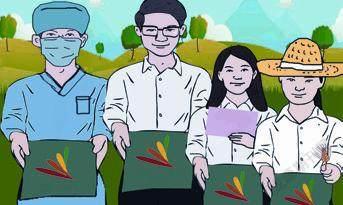How Can Young Graduates Contribute to Rural Revitalization?
According to the Ministry of Human Resources and Social Security and the Ministry of Finance, this year, 34,000 college graduates will be recruited by the government for community-level posts in education, agriculture, healthcare and poverty relief for two to three years, mainly in rural areas, to help with rural revitalization.
Since 2006, around 500,000 young graduates have served in this program. Using their expertise, they have brought urgently needed advanced agricultural knowledge to help with farming, offered professional health services to farmers who may not be able to afford to go to big hospitals, and imparted knowledge to children using novel methods that local teachers have never adopted.
A growing number of young graduates are applying for such posts, where they can contribute their knowledge and talent to rural revitalization while at the same time becoming more capable in their respective professional areas.
Xiang Qiu (www.gmw.cn): College graduates are a strong force for the revitalization of rural areas. The young should be encouraged to go where they are most needed to make the most of their potential.
Recruitment policies should favor underdeveloped areas and remote regions, and also young graduates from unemployed families. In order for young people to devote themselves to their work in the mountains, they must be covered by the social security net and relevant subsidies.

From the ivory tower to less developed rural areas, young graduates need to first overcome their instinctive anxiety and adapt themselves to local conditions as soon as possible. In addition to young people’s own endeavors to strengthen their career development, organizations that hire them should also offer training and improvement opportunities.
Rural areas that wish to retain these young graduates should give them easier access to posts suitable for their capabilities after their initial two or three-year contracts expire.
Li Hongjun (www.ycwb.com): To go to rural areas and contribute to local education is an effective way for young graduates to realize their dream of giving back to society.
While encouraging young graduates to devote themselves to improving healthcare in the countryside, the state should also increase inputs in rural healthcare facilities, as to create a better working environment for them.
As a large agricultural country, China needs to revitalize its rural areas if it is to rejuvenate the nation on the whole. The key here is to equip villages with sufficient modern agricultural professionals. To produce more grain on the same field demands the guidance of modern agricultural knowledge and technology. Young graduates may fit the bill in this regard.
China has just eradicated absolute poverty, however, relative poverty still exists. Young graduates must work closely with local officials and farmers and learn from them, as to really do something to consolidate the fruits of poverty relief and make villagers’ lives better.
Zheng Yan (www.people.com.cn): Challenging working conditions can help young graduates become capable more quickly than in comfortable situations. Today, young people’s work [in rural areas] is no longer confined to education, agriculture, healthcare and poverty reduction. Now, other areas such as culture also demand their involvement. The program provides a rich soil for their growth.
In the process of realizing modernization, rural areas remain the hardest nut to crack. In this round of talent recruitment, young graduates will mainly be sent to counties that have just shaken off absolute poverty or have received a large quantity of relocated people from poor areas. This arrangement can best serve the purpose of revitalizing rural areas. BR

